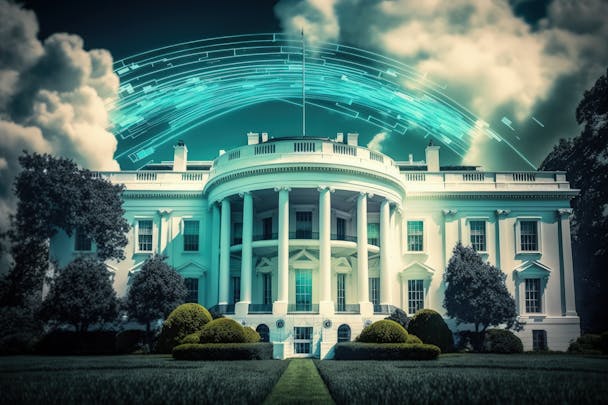Innovation v dystopia: what President Biden's AI order gets right - and wrong
The IAB’s Lartease Tiffith offers an incisive review of how President Biden's 'Key AI Actions' threaten to shake up the development of the technology and the world of marketing.

When new technologies arrive, they are almost always accompanied by apocalyptic predictions.
The New York World wrote of electricity: “Everything that will hold electricity is becoming more or less charged (...) the earth, especially in the case of large cities, and the houses are being more or less saturated with it. It is time to call a halt before this thing goes any farther.”
Advertisement
The Reverend A. C. Johnson said, “In just 32 years from now, the electricity stored in the earth will come in contact with the heated matter inside and blow the whole world up.”
Legislators, wisely, aimed to mitigate the risks without needlessly hampering innovation. Not only has the world not blown up, but everywhere we look, we see that higher GDP levels correlate with greater electricity use, access, reliability, and affordability.
America led the world then – the first central generating plant on Earth was in Manhattan – and we can do it again.
Those dystopian narratives are back now, this time about artificial intelligence (AI). One author writes it’s more likely to lead to human extinction than climate change, pandemics, asteroid strikes, supervolcanoes, and nuclear war combined.
Advertisement
Of course, artificial intelligence is not the same as electricity, and the nature of the risks differ. Still, the legislative goal should remain the same: mitigate the risks of the new technology without needlessly hampering innovation.
Artificial intelligence is not as new as many think
As far back as 1955, Herbert Simon and Allen Newell developed the Logic Theorist, the first AI program. And for more than a decade, AI has been quietly (and safely) helping the entire digital advertising industry – everyone from major brands and agencies to technology platforms and adtech firms – improve data privacy, boost ad personalization, and drive cost-efficiencies and revenue.
Still, the rise of generative AI has captured the public imagination like nothing before it.
Suggested newsletters for you
The advent of gen AI that can create text, images, video, code, and other output – has the power to transform online creativity and commerce. There’s a sense that this changes everything, and in some ways, it does.
But the path to progress is never smooth, and the first beneficiaries are almost always lawyers. Scarlett Johansson is suing an AI app that used her name and likeness in an online ad without permission. A promotional video for a dental plan that features an AI version of Tom Hanks led the real Tom Hanks to go on Instagram to say he had nothing to do with it. At least in part, the Actor’s Guild 118-day strike was about AI.
Yet with that peril comes real promise. AI was able to successfully isolate John Lennon’s real vocal track from an ancient cassette demo and give us one last hit record from The Beatles. More importantly, the lives of children with disabilities can be transformed by AI-assisted tools that make navigating the world radically easier.
What Biden’s Executive Order on AI gets right
Whether America leads or lags in the future depends on what we do now, and that’s why I’m encouraged by President Biden’s recent 'Executive Order on Safe, Secure, and Trustworthy Artificial Intelligence.'
There’s a lot that it gets right.
First, the administration has correctly focused on preventing deception and bias.
Darrell West, senior fellow at the Center for Technology Innovation at the Brookings Institution, warns of “a tsunami of disinformation in the upcoming election.”
It’s already happening. Just two days before Slovakia’s elections, an audio recording was posted to Facebook. On it were the AI-faked voices of candidate Michal Šimečk and newspaper executive Monika Tódová, discussing how to rig the election.
It is also important that we ensure that AI algorithms are not discriminating against people based on protected categories such as race, gender, and sexual orientation - like when AI gave Sudanese Barbie a gun. In short, AI algorithms should not be able to do anything that a human would not be able to do. To the extent that our civil rights laws do not explicitly prohibit AI algorithms from discriminating, Congress should act to close that gap. In the meantime, President Biden’s Executive Order will help.
The order is also right to urge stronger protections for content creators and publishers. At IAB, we are deeply concerned about protecting publishers' intellectual property. How do we ensure publishers’ content isn’t being ingested and disintermediated?
Already this summer, a group of publishers started planning a lawsuit against AI companies. What’s more, the recent ruling in the Sarah Silverman AI case v Meta is troubling. As Nieman Lab reports, “If that is the legal bar – an AI must produce outputs identical or near-identical to existing copyrighted work to be infringing – news companies have a very hard road ahead of them.”
We will need clear protections for publishers’ content, and President Biden’s Executive Order acknowledges this.
The President is also right to accelerate the development and use of privacy-preserving techniques for AI, and I hope that this becomes part of a larger national privacy legislation. The growing patchwork of state-by-state regulation is chaotic and bad for advertisers and consumers alike. A consumer’s expectations of privacy shouldn’t depend on which state they live in. Privacy needs to be consistent and predictable, and national legislation is the way to achieve that.
President Biden’s efforts to ensure that AI will be tested to avoid bias – which is a very real risk that must be addressed – should also be applauded.
Not all risks are created equal
In all of this, legislation must strike the right balance.
There’s an enormous difference between asking AI to write a birthday poem for a six-year-old who loves dinosaurs and asking it to choose the optimal medical treatment for a potentially fatal disease.
Instead of one-size-fits-all regulations, we need a dynamic, risk-centered approach to AI. America is not alone in confronting the challenge of how to achieve this. AI in the EU will be regulated by the AI Act, the world’s first comprehensive AI law. The EU’s proposal to have different regulations for different risk levels – Unacceptable Risk, High Risk, and Limited Risk – is a commonsense approach. There are important discussions to be had about how those risks are defined and what activities belong at which level, but the fundamental concept is sound.
The hidden risks of short-sighted legislation
There will always be the urge to overcorrect, to say, “We can’t be too careful.” But we must remember that overly restrictive regulations can solidify the dominance of a few large companies – if the costs of compliance are too high, small innovative companies will not be able to afford them.
Those who are concerned about the power of big technology companies might make things worse, not better. Competition is good – including for giants.
The other very real risk is to national security. If regulations are overly restrictive, the most innovative founders will choose to start their companies elsewhere.
To the north, Canada has five major tech hubs and has a progressive immigration policy that encourages skilled immigrants to settle in Canada and contribute to the economy.
To the south, Start-Up Chile is the first public accelerator in the world, offering equity-free funding, free co-working space, and up to $300,000 in exclusive benefits and discounts with services such as Amazon Web Services (AWS), legal, accounting, hiring, design, marketing, and everything else a startup might need.
And this is to say nothing about global competitors like China. Axios reports that Shanghai is angling to become China’s AI talent hub, mirroring the role San Francisco is playing in America's AI boom. As Microsoft’s president Brad Smith noted, “No one in the United States should ever underestimate the speed at which the Chinese economy, including in the private sector, or even the state-owned enterprises, deploy new technology.”
The most important thing that this Executive Order got right is that it didn’t allow a focus on challenges and dystopian thinking to lead its decision-making. There is enormous opportunity ahead, and we need to steer toward it and not away from it.

